Recommended Reading
First of all, out of a very strong field (see posts passim), Colson Whitehead took this year's Arthur C Clarke award for his Underground Railway, which is a thought-provoking and powerful read. Definitely check it out, as well as the other fine books on the shortlist.
It's been too long, Clarkes aside, since I wrote a post about good stuff I've read, meaning that plenty of good stuff has likely now slipped my memory (the phrase about good books being undeservedly forgotten is never truer than with me). I am also rather aware that I have a surfeit of good books waiting to be read, including Justina Robson's Switch and Peter Newman's The Seven, so hopefully I'll do those soon enough. Peter's in particular has been like a carrot on a stick in the near future, but as it's also an enormous hardback and I've been on the move, it's not had the attention it doubtless deserves. However, my list is not entirely Newmanless, so there's something. Also not yet read is Ed McDonald's Blackwing, though I hear good things of it and will be acquiring a copy in short order.
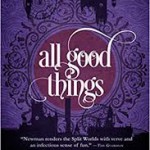 So, what have we got? First of all, All Good Things, which I finished on the train coming back from the Clarkes. This is Emma Newman's conclusion to her Split Worlds series, which has been a favourite of mine from the start. I cannot really review this in detail because it is indeed the frankly apocalyptic conclusion to the series, and therefore every word would be a spoiler for the earlier volumes, but it is filled with twists and upped antes and some serious revelations about how the whole setting actually works. One of the best features of Newman's world-building is that there really are very few reliables — there are a lot of big powers and factions, and labelling anyone with power as "good" is a risky business throughout. Also, given that "the status quo" is practically the villain, this isn't another fantasy series that just aims to get back to where it started.
So, what have we got? First of all, All Good Things, which I finished on the train coming back from the Clarkes. This is Emma Newman's conclusion to her Split Worlds series, which has been a favourite of mine from the start. I cannot really review this in detail because it is indeed the frankly apocalyptic conclusion to the series, and therefore every word would be a spoiler for the earlier volumes, but it is filled with twists and upped antes and some serious revelations about how the whole setting actually works. One of the best features of Newman's world-building is that there really are very few reliables — there are a lot of big powers and factions, and labelling anyone with power as "good" is a risky business throughout. Also, given that "the status quo" is practically the villain, this isn't another fantasy series that just aims to get back to where it started.
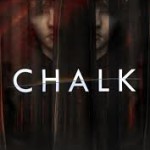 Another frequent visitor to these posts is Paul Cornell, but his most recent read is something of a different fish. It's true that his Lychford novellas have a tint of the horrors to them, and he's shown in the Shadow Police series that he has a deft hand at creating really visceral nastiness when he sets his mind to it. Chalk, however, is a full on proper old horror novel, and my caveat here is that horror isn't my usual territory as a reader. Chalk is extremely good, though, and my usual squeamishness was not a factor. It's psychological and supernatural threat rather than jump scares and buckets of blood. The setting is a private school and it goes into a lot of uncomfortable territory regarding bullying, Stockholm syndrome and the darkness of old folkways. The balance of what is and isn't real, and how much supernature is generally there, is very carefully handled (I choose to believe "a bucketload" but the reader can interpret things either way, season to taste). It's a compelling and disconcerting read.
Another frequent visitor to these posts is Paul Cornell, but his most recent read is something of a different fish. It's true that his Lychford novellas have a tint of the horrors to them, and he's shown in the Shadow Police series that he has a deft hand at creating really visceral nastiness when he sets his mind to it. Chalk, however, is a full on proper old horror novel, and my caveat here is that horror isn't my usual territory as a reader. Chalk is extremely good, though, and my usual squeamishness was not a factor. It's psychological and supernatural threat rather than jump scares and buckets of blood. The setting is a private school and it goes into a lot of uncomfortable territory regarding bullying, Stockholm syndrome and the darkness of old folkways. The balance of what is and isn't real, and how much supernature is generally there, is very carefully handled (I choose to believe "a bucketload" but the reader can interpret things either way, season to taste). It's a compelling and disconcerting read.
Paul and Emma are both regulars, and people whose books I will generally seek out both because I know them and I know I enjoy what they write. I have, however, been chasing down some newcomers to the fantasy scene, as there's been quite a flowering of new talent in the heroic fantasy planter recently. Ed McDonald, as per the above, is one, but the books I have devoured so far include:
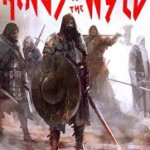 Kings of the Wyld by Nicholas Eames is first. This is a book that left me a little conflicted, but on the other hand I enjoyed reading it so much that I'd be false to myself if I didn't flag it up here. This is a good old heroic quest novel in a world where bands of monster-slaying mercenaries are treated like rock bands — touring around in lavishly outfitted wagons or airships, getting hordes of screaming groupies, all of that. The protagonists were, in times past, the rock gods of their day, but they got old and mostly retired, and now the lead man wants to get them together for one more gig, for the highest stakes. Eames writes semi-comedy fantasy very well (it's the same kind of level as a lot of Spiderlight, if you liked that), his characters are likeable, his world is wild and very (intentionally) D&D‑ish. It's a great fun read. There is a subplot about the actual morality of killing non-humans which is left hanging, but I suspect the later books will return to it. There's also a definite dearth of significant female characters who aren't presented as motivation or eye-candy, which is something I've seen other reviews pick up on. The imbalance is in the book's cast but not inherently in the world, which has considerable diversity in its supporting cast, and from what I hear the second book will focus primarily on the women of the next generation of mercenaries, and Eames' writing overall is highly entertaining (also, Eames' ideas on spinning the old dead bard joke are very similar to a direction I've taken in a project thankfully delivered before I read this).
Kings of the Wyld by Nicholas Eames is first. This is a book that left me a little conflicted, but on the other hand I enjoyed reading it so much that I'd be false to myself if I didn't flag it up here. This is a good old heroic quest novel in a world where bands of monster-slaying mercenaries are treated like rock bands — touring around in lavishly outfitted wagons or airships, getting hordes of screaming groupies, all of that. The protagonists were, in times past, the rock gods of their day, but they got old and mostly retired, and now the lead man wants to get them together for one more gig, for the highest stakes. Eames writes semi-comedy fantasy very well (it's the same kind of level as a lot of Spiderlight, if you liked that), his characters are likeable, his world is wild and very (intentionally) D&D‑ish. It's a great fun read. There is a subplot about the actual morality of killing non-humans which is left hanging, but I suspect the later books will return to it. There's also a definite dearth of significant female characters who aren't presented as motivation or eye-candy, which is something I've seen other reviews pick up on. The imbalance is in the book's cast but not inherently in the world, which has considerable diversity in its supporting cast, and from what I hear the second book will focus primarily on the women of the next generation of mercenaries, and Eames' writing overall is highly entertaining (also, Eames' ideas on spinning the old dead bard joke are very similar to a direction I've taken in a project thankfully delivered before I read this).
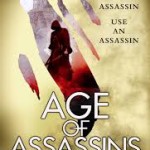 Then we have RJ Barker's Age of Assassins. I was a little leery going into this one: it's a castle intrigue story of treachery, nobles and assassins (obviously), and sits squarely in territory already well travelled in the genre (it might just be the simultaneous presence of fools and assassins but Robin Hobb loomed large in the mind), and normally that wouldn't exercise me much. However, Barker gives everything a lively and engaging spin drawn entirely from his prose style and his characterisation. The story clips along and I ended up nearly missing train stops because I was so immersed in it. The hero is an apprentice assassin, lame and possessed of unusual skills, brought in by his master to infiltrate a castle's squires and track down the source of an existing assassin problem. The double life is a nice touch, and you genuinely feel for him as he's torn between the truth of his life, and his glimpse of something better (and/or worse because a lot of his peers in the castle are bastards). There are some interesting bits to the world, too, focusing on the way magic works (and backfires) which look as though they're breadcrumbs for later development, but overall this is simply a good story, well told.
Then we have RJ Barker's Age of Assassins. I was a little leery going into this one: it's a castle intrigue story of treachery, nobles and assassins (obviously), and sits squarely in territory already well travelled in the genre (it might just be the simultaneous presence of fools and assassins but Robin Hobb loomed large in the mind), and normally that wouldn't exercise me much. However, Barker gives everything a lively and engaging spin drawn entirely from his prose style and his characterisation. The story clips along and I ended up nearly missing train stops because I was so immersed in it. The hero is an apprentice assassin, lame and possessed of unusual skills, brought in by his master to infiltrate a castle's squires and track down the source of an existing assassin problem. The double life is a nice touch, and you genuinely feel for him as he's torn between the truth of his life, and his glimpse of something better (and/or worse because a lot of his peers in the castle are bastards). There are some interesting bits to the world, too, focusing on the way magic works (and backfires) which look as though they're breadcrumbs for later development, but overall this is simply a good story, well told.
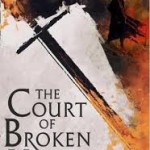 The Court of Broken Knives by Anna Smith Spark is last on my list, and this is also a story of mercenaries and politicians and the terrible, terrible things that happen when they mix. Smith Sparkes is @queenofgrimdark on Twitter, and this is a very grim and dark book indeed. It's a book of horrible people doing horrible things to each other, and that's the sort of thing that can wear on the mind if not properly excecuted. There are writers who can pull off the trick to perfection, though — KJ Parker, say, or Abercrombie, or GRR Martin himself, and Smith Sparks is most certainly in that select company. She has a gift of making the reader like utter monsters for the moments they come under her narrative hand, only to realise the moment they step from the limelight just how appalling are the people we've been rooting for. Moreover, Smith Sparks is an exquisite stylist. Her prose has a rare poetic flair to it that gives every stab in the back and botched betrayal a sense of Homeric epic tragedy, so that the actions of traitors, murderers and addicts are clothed in a kind of divine grace. Broken Knives is not necessarily a comfortable read, given the bloody and brutal territory it covers, but it is a beautiful read.
The Court of Broken Knives by Anna Smith Spark is last on my list, and this is also a story of mercenaries and politicians and the terrible, terrible things that happen when they mix. Smith Sparkes is @queenofgrimdark on Twitter, and this is a very grim and dark book indeed. It's a book of horrible people doing horrible things to each other, and that's the sort of thing that can wear on the mind if not properly excecuted. There are writers who can pull off the trick to perfection, though — KJ Parker, say, or Abercrombie, or GRR Martin himself, and Smith Sparks is most certainly in that select company. She has a gift of making the reader like utter monsters for the moments they come under her narrative hand, only to realise the moment they step from the limelight just how appalling are the people we've been rooting for. Moreover, Smith Sparks is an exquisite stylist. Her prose has a rare poetic flair to it that gives every stab in the back and botched betrayal a sense of Homeric epic tragedy, so that the actions of traitors, murderers and addicts are clothed in a kind of divine grace. Broken Knives is not necessarily a comfortable read, given the bloody and brutal territory it covers, but it is a beautiful read.
 © 2008-2025 Pan Macmillan
© 2008-2025 Pan Macmillan
[…] piece of other news: here’s the brilliant Adrian Tchaikovsky saying some very kind things about Chalk and several other […]